|
|
|
Sort Order |
|
|
|
Items / Page
|
|
|
|
|
|
|
| Srl | Item |
| 1 |
ID:
113702
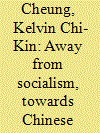

|
|
|
|
|
| Publication |
2012.
|
| Summary/Abstract |
Following the success of China's economic reform in the past few decades, Chinese nationalism has entered a new stage. The sentiment born of 'the century of national humiliation' is insufficient to explain the phenomenon of Chinese new nationalism. In this new era, China no longer regards the West as the benchmark against which it defines its success, but is becoming more assertive about its own values and perspectives. This emphasis on a Chinese perspective is related to the cultural shift in China's post-socialist transition, where the source of legitimacy in China's development has moved from an ideological dimension of socialism to a cultural dimension of 'Chinese characteristics'. Following this transition, growing importance is being placed on an indigenous voice in many aspects of China's development, including the recent efforts to reinvent traditional Chinese culture as a source of China's soft power. In particular, with strong state sponsorship, Confucianism is being revived as a new nationalist discourse, which not only provides new discursive resources for continuing authoritarianism in mainland China, but also redefines governance and nation-building with respect to Hong Kong and Taiwan.
|
|
|
|
|
|
|
|
|
|
|
|
|
|
|
|
| 2 |
ID:
174188
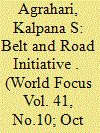

|
|
|
|
|
| Summary/Abstract |
Nationalism has been a crucial factor for the ruling Communist Party in legitimizing its rule in the country since communist revolution. The slogan of ‘China Dream,’ coined by the president Xi Zinping, seeks to retrieve lost territories and to achieve the glory of past days.
|
|
|
|
|
|
|
|
|
|
|
|
|
|
|
|
| 3 |
ID:
175372
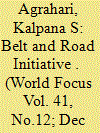

|
|
|
|
|
| Summary/Abstract |
Nationalism has been a perilous journey for China shaped by the historical factor of humiliation of great China by foreign powers. Recognizing China as a victim country is a core theme of Chinese edition of nationalism which accuses the imperial and colonist forces of 19th and 20th centuries for the loss of Chinese territory and its vanity. The people of China were full of pride and believed themselves as the epicenter of global politics until they faced setback in wars with Britain and Japan in the 19th century.
|
|
|
|
|
|
|
|
|
|
|
|
|
|
|
|
| 4 |
ID:
184089
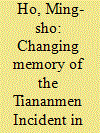

|
|
|
|
|
| Summary/Abstract |
This article examines the three-decade evolution of remembering the Tiananmen Incident in Taiwan by looking at annual commemorative activities. There is a decisive shift from a patriotic understanding to a cosmopolitan perspective grounded in universal values. The earlier memory was based on an ethnic nationalism that stressed consanguinity among Taiwanese and mainland Chinese and a narrative of the Chinese Republican Revolution. However, such framing lost its persuasiveness and the memory of Tiananmen faded as Taiwanese, particularly the younger generation, embraced an indigenous identity. China’s rapid economic growth and its ascendency as a new world power neutralized the potency of the earlier memory because it demonstrated the possibility of nationalistic aspirations without democracy. Since 2011, commemorative rallies have revived and proceeded with a newer understanding of the Tiananmen Incident in terms of human rights, civil society, and youth activism. This article argues that this ‘mnemonic change’ reflects Taiwan’s democratization and the indigenization of Taiwanese society, enabling young organizers to articulate their own Tiananmen memory by referencing global civil-society activism. Mnemonic change in Taiwan is examined with a comparative reference to the parallel development in Hong Kong.
|
|
|
|
|
|
|
|
|
|
|
|
|
|
|
|
| 5 |
ID:
116570
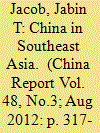

|
|
|
|
|
| Publication |
2012.
|
| Summary/Abstract |
Despite China's claims of a foreign policy of 'peaceful rise'/'peaceful development' and of seeking a 'harmonious world', and despite its economic openness and active participation in economic multilateralism, China's neighbours continue to be concerned about the overall direction and intent of Beijing's security policies. These concerns are particularly heightened by China's rapid military modernization of the past couple of decades. The announcement in 2010 that China considered its territorial claims in the South China Sea a 'core interest', can be seen as a setback to its regional diplomacy, so diligently crafted over the years and drove its Southeast Asian neighbours to seek closer engagement with the US. This article argues that the contradictions evident in China's neighbourhood foreign policy reflect its continuing search for a model of international relations that can balance its domestic interests such as the need for political stability, including regime stability, on the one hand and its external ambitions for a decisive role in regional affairs, on the other.
|
|
|
|
|
|
|
|
|
|
|
|
|
|
|
|
| 6 |
ID:
115612
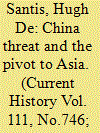

|
|
|
|
|
| Publication |
2012.
|
| Summary/Abstract |
America's expanding military footprint in Asia may be more of a provocation than a deterrent to China's aggressive behavior.
|
|
|
|
|
|
|
|
|
|
|
|
|
|
|
|
| 7 |
ID:
144795
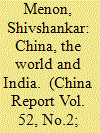

|
|
|
|
|
| Summary/Abstract |
After more than three decades of stupendous growth, China is in the process of making the painful transition to a lower growth path. As it does so, the ruling CPC is increasingly turning to nationalism to provide legitimacy in the eyes of its own people. China now openly seeks to ‘display its prowess’ and ‘assume its responsibilities’ in the world. However, it still lacks the capability to impose a political or security order of its own in its immediate neighbourhood. There is, therefore, likely to be a period of instability in the Asia–Pacific region, and the environment in which India pursues its interests will get more complex. China and India today have a relationship with elements of both cooperation and competition. While both countries have a common interest in improving on the existing security and economic order, they compete in the periphery they share. A danger present in present-day India–China relations comes from the mutual gap between perception and reality. Nevertheless, this article argues that this is a moment of opportunity for India–China relations, and that each country could benefit its core interests by working with the other.
|
|
|
|
|
|
|
|
|
|
|
|
|
|
|
|
| 8 |
ID:
078579
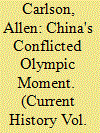

|
|
|
|
|
| Publication |
2007.
|
| Summary/Abstract |
Beijing has worked meticulously to foster the image of China as a responsible power. At the same time, opposition to US hegemony is one of the pillars of Chinese nationalism
|
|
|
|
|
|
|
|
|
|
|
|
|
|
|
|
| 9 |
ID:
088072
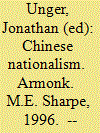

|
|
|
|
|
| Publication |
Armonk, M.E. Sharpe, 1996.
|
| Description |
xviii, 218p.
|
| Series |
Contemporary China paper.
|
|
|
|
|
|
|
|
|
|
|
|
Copies: C:1/I:0,R:0,Q:0
Circulation
| Accession# | Call# | Current Location | Status | Policy | Location |
| 040276 | 320.540951/UNG 040276 | Main | On Shelf | General | |
|
|
|
|
| 10 |
ID:
079467
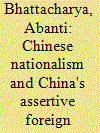

|
|
|
| 11 |
ID:
114228
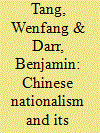

|
|
|
|
|
| Publication |
2012.
|
| Summary/Abstract |
Using the 2008 China Survey, this paper examines Chinese respondents' feelings toward their country and how such feelings are related to their democratic values. First, it compares Chinese nationalism with that of 35 countries and regions in the 2003 National Identity Survey. Second, it looks at the origins of Chinese nationalism as embedded in the social and political characteristics of individuals. Third, it further examines the impact of nationalism on people's political attitudes. The findings show that nationalism in contemporary China is better predicted by the political and economic characteristics of an individual rather than cultural attributes, and that nationalism serves as a powerful instrument in impeding public demand for democratic change.
|
|
|
|
|
|
|
|
|
|
|
|
|
|
|
|
| 12 |
ID:
192129
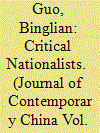

|
|
|
|
|
| Summary/Abstract |
This study systematically examines, deconstructs, and maps the quotidian nationalist discourse among Chinese netizens and analyzes their ‘liking’ behavior on the social media platform, Zhihu, in order to investigate what and how they talk about nationalism. The analysis of the quotidian expression of nationalism marks a shift from the previous practice of relying on high-profile nationalist movements as evidence which may create an incomplete or inaccurate impression that much of Chinese nationalism is virulent and over-zealous. This study finds that Zhihu users are critical nationalists who are competitive but judicious. The existence of levelheaded nationalists in China’s online space suggests the limits of strident nationalist contagion and nationalist mobilization.
|
|
|
|
|
|
|
|
|
|
|
|
|
|
|
|
| 13 |
ID:
060180
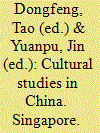

|
|
|
|
|
| Publication |
Singapore, Marshall Carvendish Academic, 2005.
|
| Description |
vi, 209p.pbk
|
| Series |
Materialising China:visions and perspectives series
|
| Standard Number |
9812102892
|
|
|
|
|
|
|
|
|
|
|
|
Copies: C:1/I:0,R:0,Q:0
Circulation
| Accession# | Call# | Current Location | Status | Policy | Location |
| 049419 | 951/DON 049419 | Main | On Shelf | General | |
|
|
|
|
| 14 |
ID:
111169
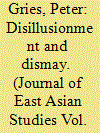

|
|
|
|
|
| Publication |
2012.
|
| Summary/Abstract |
The deterioration of Sino-South Korean relations following the attacks on the Cheonan and on Yonpyong Island in 2010 has again raised the question of Chinese intentions in the Korean peninsula. In this article, I explore Chinese netizen views of the two Koreas. Qualitative and quantitative evidence (in the form of a large-scale national Internet survey) provide convergent evidence that while Chinese netizens feel coolly toward both Koreas, they think and feel about them in very different ways. Chinese netizens appear to be profoundly disillusioned with a North Korea that refuses to adopt Chinese-style "reform and opening," which only reminds them of their poor and authoritarian past. However, recent high-profile historical and cultural disputes appear to have led to widespread Chinese dismay and even anger toward South Korea as well, which is perceived to be poaching on China's proud cultural heritage. These attitudes toward Korea are reflective of evolving Chinese understandings of what it means to be Chinese in the twenty-first century.
|
|
|
|
|
|
|
|
|
|
|
|
|
|
|
|
| 15 |
ID:
153382
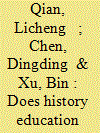

|
|
|
|
|
| Summary/Abstract |
Most studies of Chinese nationalism are based on an unstated and unexamined assumption that history education in Chinese schools can effectively instill the official memory of the anti-Japanese war into students. This article tests this assumption through a multi-method study based on a survey, a textual analysis and qualitative interviews with high school students and teachers. The findings show that history education (including both in-class and extracurricular forms) has limited effects on nationalism among Chinese high school students. The in-class textbook education is largely ineffective in forging nationalistic sentiments among students, whereas some extracurricular activities, such as visiting the ‘patriotic education bases’, have limited effects. The limited effects can be explained by four factors: (1) changes in the content and form of the new history textbooks; (2) the students’ and teachers’ actual uses of the textbooks; (3) the students’ cognitive and emotional agency in receiving history education; and (4) alternative information sources such as the media and family memory. This study contributes to the understanding of Chinese nationalism and historical memory by emphasizing the complexity involved in receiving official narratives.
|
|
|
|
|
|
|
|
|
|
|
|
|
|
|
|
| 16 |
ID:
122521
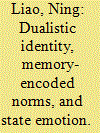

|
|
|
|
|
| Publication |
2013.
|
| Summary/Abstract |
By tracing the origin and evolution of Chinese nationalism, this paper finds that the dialectical relationship between the Chinese "self" and the foreign "other" has provided the cultural-institutional context for the construction of its national identity. The positional change of the Chinese actor in the self-other interaction-resulting from the institutional shift from the tianxia order to the Westphalian system-and the consequent national humiliation have been embedded in the Chinese collective memory and given rise to the consensual norms ingrained in the national identity. Viewed through the lens of political sociology and identity politics, China's tenacious struggle for national rejuvenation can be construed as a social practice guided by these memory-encoded social norms. Due to the protracted and ambivalent nature of the state's purposive action in attaining great-power status on the international stage, the confidence of the resurgent state is compromised by an acute sense of frustration. This identity predicament has engendered a peculiar Chinese state emotion, which has profoundly influenced the in-group members' evaluation and perception of out-group entities and their behavior in the antagonistic intergroup relations.
|
|
|
|
|
|
|
|
|
|
|
|
|
|
|
|
| 17 |
ID:
006514
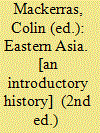

|
|
|
|
|
| Edition |
2nd ed.
|
| Publication |
Melbourne, Longman, 1995.
|
| Description |
xi, 676p.pbk
|
| Standard Number |
0582806607
|
|
|
|
|
|
|
|
|
|
|
|
Copies: C:1/I:0,R:0,Q:0
Circulation
| Accession# | Call# | Current Location | Status | Policy | Location |
| 038249 | 950/MAC 038249 | Main | On Shelf | General | |
|
|
|
|
| 18 |
ID:
170699
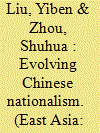

|
|
|
|
|
| Summary/Abstract |
Nationalist discourse has long been an important apparatus in modern politics. This paper showed a sharp, yet subtle departure of the Chinese government in its current manipulation of nationalism. Instead of the hardcore revolutionary rhetoric, the new phase of nationalist discourse incorporated many elements of Confucianism to better consolidate the communist regime. Using the 2015 military parade as an example, this paper analyzed how the Chinese central government evoked sentiments and consciousness of nationalism by utilizing and interweaving Confucianism elements of family value, benevolent (Ren), propriety (Li), equilibrium, and harmony into the party-state’s official nationalist discourse. Significance of such organized endeavors in political discourse is discussed.
|
|
|
|
|
|
|
|
|
|
|
|
|
|
|
|
| 19 |
ID:
123709
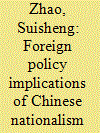

|
|
|
|
|
| Publication |
2013.
|
| Summary/Abstract |
This paper revisits the debate about foreign policy implications of Chinese nationalism in the context of China's increasingly confrontational and assertive behavior in recent years. It argues that while the Chinese government made effective efforts to control popular nationalism and Chinese foreign policy was therefore not dictated by emotional nationalistic rhetoric before 2008, it has become more willing to follow the popular nationalist calls to take a confrontational position against the Western powers and to adopt tougher measures in maritime territorial disputes with its neighbors. This strident turn is partially because the government is increasingly responsive to public opinion, but more importantly because of the convergence of Chinese state nationalism and popular nationalism calling for a more muscular Chinese foreign policy. Enjoying an inflated sense of empowerment supported by its new quotient of wealth and military capacities, and terrified of an uncertain future due to increasing social, economic and political tensions at home, the communist state has become more willing to play to the popular nationalist gallery in pursuing the so-called core national interests. These developments have complicated China's diplomacy, creating a heated political environment to harden China's foreign policy.
|
|
|
|
|
|
|
|
|
|
|
|
|
|
|
|
| 20 |
ID:
175473
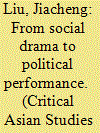

|
|
|
|
|
| Summary/Abstract |
This paper analyzes the social crisis of the Covid-19 epidemic and the government responses in China from a performance perspective. It argues that the epidemic outbreak in late December 2019 initiated a highly contested social drama, in which loyalty was tested, political order questioned, and ideological crisis made visible. The numerous netizens and residents drew on a wide-ranging repertoire of discourses, symbols, and narratives to heighten public spectacles of suffering and sympathy, which placed extensive blame on the lies, negligence, and censorship of the government. Nonetheless, within the short span of three months, the conflictive, cacophonous social drama was overshadowed and subsumed by a hegemonic political performance of national victory, unity, and patriotism, framed and channeled by state propaganda, censorship, ritual, and practical policies. Social protests in cyberspace continued in even more dramatic forms. But these it only constituted sporadic performances of resistance, rather than a monumental social drama that challenged the fundamental political order.
|
|
|
|
|
|
|
|
|
|
|
|
|
|
|
|
|
|
|
|
|